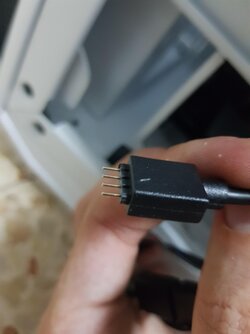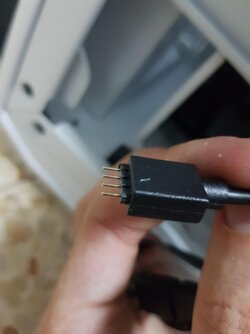I was playing Overwatch today, and all of a sudden, the PC just shut down out of nowhere. I power it on, try to go into Overwatch, shuts down again. OK, I open the case, shut the PSU down for 30 seconds, try again. Something is making noise. Either one of my two pumps or the fans or all of them.
I monitor GPU temps - normal, 30c. Pump RPM is also normal.
I monitor CPU temps- 70c spikes, looks high, but when running CPU-Z stress for a few minutes, I get 70ish - looks about normal. I cannot monitor pump RPM unfortunately.
OK, I shut down the PC and check the cables - They look OK, but cannot get a good look. I try to power it on again - it powers for a split second and shuts down (fans turn on and die within the same second) RAM RGB lights up and stays on, also the keyboard and USB devices, but that's it, no fans, no pumps, no display.
Anyway, PC is currently dead. I'm trying to diagnose the problem. I think it's either:
a) psu issue
b) motherboard issue
c) bad connection
Is there any way I can diagnose the problem without changing everything?
I think it's not any of the following components: Bad CPU should give POST problems, bad RAM should give POST problems, bad GPU should give display problems, bad SSD should give boot problems -> All of those things should not stop the fans and pumps from running.
Regarding the fans and pumps:
Corsair H75 - Connected directly to PSU via molex adapter
CPU Fans - Connected to motherboard via PWM splitter (both are connected to CPU fan header)
Kraken X41 - Connected directly to PSU via molex adapter
GPU Fans - Connected to Kraken X41 fan controller, which connects to internal USB connection to the motherboard.
In my opinion the PSU is busted, but it's hard to tell. Anyone have experience with those things? Rig available in my signature.
EDIT:
I got the PC to work for about an hour by removing some extra cables. I did the following tests:
- Superposition & FireStrike Ultra : Those are GPU intensive applications, got normal scores, passed stress test, temperatures are good.
- Ran RealBench for an hour: Crashed during the test, issue happened again. Shut down, attempted a reboot, failed. It was NOT because of temperatures - CPU cores were at 70-80, which is normal for 8700k.
Final EDIT:
issue is resolved. I removed the PSU, unplugged all the cables, re-seated GPU, re-seated PSU, plugged all the connections back - everything works. This was probably a loose connection. I think it was caused by me when I switched to a new case and worked on the cable management. Most likely the back panel which required force to be held in place, strained one of the connectors. When working with a new case always make sure you route the cables properly.
I monitor GPU temps - normal, 30c. Pump RPM is also normal.
I monitor CPU temps- 70c spikes, looks high, but when running CPU-Z stress for a few minutes, I get 70ish - looks about normal. I cannot monitor pump RPM unfortunately.
OK, I shut down the PC and check the cables - They look OK, but cannot get a good look. I try to power it on again - it powers for a split second and shuts down (fans turn on and die within the same second) RAM RGB lights up and stays on, also the keyboard and USB devices, but that's it, no fans, no pumps, no display.
Anyway, PC is currently dead. I'm trying to diagnose the problem. I think it's either:
a) psu issue
b) motherboard issue
c) bad connection
Is there any way I can diagnose the problem without changing everything?
I think it's not any of the following components: Bad CPU should give POST problems, bad RAM should give POST problems, bad GPU should give display problems, bad SSD should give boot problems -> All of those things should not stop the fans and pumps from running.
Regarding the fans and pumps:
Corsair H75 - Connected directly to PSU via molex adapter
CPU Fans - Connected to motherboard via PWM splitter (both are connected to CPU fan header)
Kraken X41 - Connected directly to PSU via molex adapter
GPU Fans - Connected to Kraken X41 fan controller, which connects to internal USB connection to the motherboard.
In my opinion the PSU is busted, but it's hard to tell. Anyone have experience with those things? Rig available in my signature.
EDIT:
I got the PC to work for about an hour by removing some extra cables. I did the following tests:
- Superposition & FireStrike Ultra : Those are GPU intensive applications, got normal scores, passed stress test, temperatures are good.
- Ran RealBench for an hour: Crashed during the test, issue happened again. Shut down, attempted a reboot, failed. It was NOT because of temperatures - CPU cores were at 70-80, which is normal for 8700k.
Final EDIT:
issue is resolved. I removed the PSU, unplugged all the cables, re-seated GPU, re-seated PSU, plugged all the connections back - everything works. This was probably a loose connection. I think it was caused by me when I switched to a new case and worked on the cable management. Most likely the back panel which required force to be held in place, strained one of the connectors. When working with a new case always make sure you route the cables properly.
Last edited:

